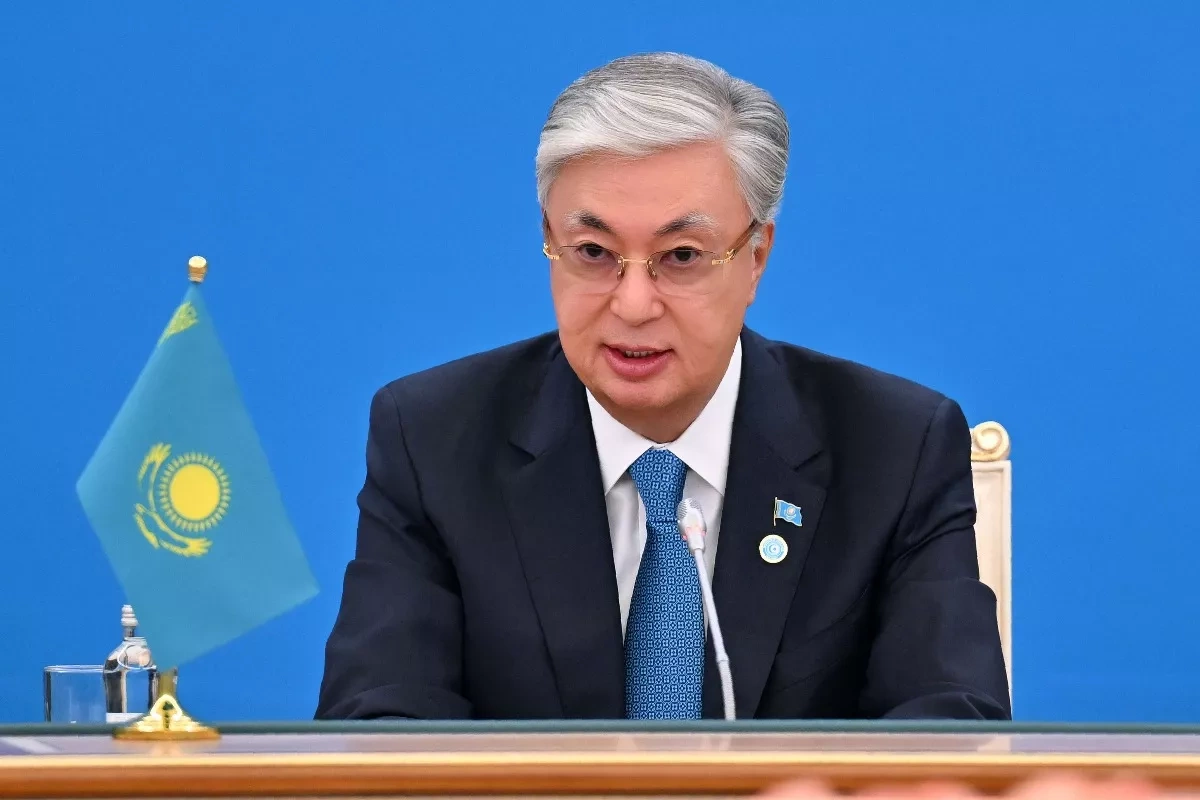
Photo: AFP/Kazakhstan's Presidential Press Service
Kazakhstan’s efforts to renegotiate decades-old, opaque oil contracts at the Kashagan field-where 98% of revenues currently benefit foreign companies-are straining its relations with the EU and highlighting broader tensions over transparency, sovereignty, and control of natural resources.
The statistic can appear humiliating for Kazakhstan, a Central Asian republic that owes an important part of its wealth to the millions of tons of oil in its soil, The Caspian Post reports citing foreign media.
According to an ICIJ investigation published last week, 98% of revenues from Kashagan - a giant offshore oil field in the Caspian Sea and Kazakhstan's most lucrative discovery in the past fifty years - are going into the coffers of foreign oil multinationals.
The revenue imbalance at Kashagan is not surprising, as the field has been exploited on highly favourable terms for foreign multinationals since agreements were signed with Kazakhstan's newly independent government in 1997.
Former Kazakh President Nazarbayev quickly partnered with Western oil giants to develop the giant offshore field, along with Tengiz and Karachaganak. These three projects - Kazakhstan's so-called 'three whales' - now supply 13% of the EU's oil.
Kashagan is exploited by the North Caspian Operating Company (NCOC), dominated by European companies such as Shell (UK), Eni (Italy) and Total Energies (France), which each hold a 16.8% stake.
But the consortium’s historical privileges could in future strain relations between the EU and the Central Asian country.
EU losing Kazakhstan?
Last January, Kazakh President Kassym Zhomart Tokayev announced that he would push for the renegotiation of oil agreements "under renewed, more beneficial conditions for the country".
The production sharing agreements (PSAs) in the Kazakh oil sector have yet never been disclosed.
“These contracts have been frozen for 30 years! This situation doesn’t exist anywhere else in the world,” said Olzhas Baidildinov, former adviser to the Kazakh Minister of Energy according to whom 98% -2% ratio seems perfectly real.
“Faced with multinationals, the real problem is that Kazakhstan has always lacked the oil specialists to impose ourselves,” added a Kazakh financial lawyer who wishes to speak anonymously.
Although the Kashagan agreements do not expire until 2037, Tokayev's determination to regain control of his country's oil has set the tone for European companies in the NCOC, against the backdrop of an arbitration procedure that European operators have little sympathy for.
TotalEnergies CEO Patrick Pouyanné pledged in April 2023 to "fight" the claims, saying the partners were "really united."
Kazakhstan has now an $160 billion arbitration case against foreign oil firms, citing procedural and environmental breaches, but at its core targets decades-old contracts that divert nearly all Kashagan revenues abroad.
This friction between multinationals and the Kazakh government comes at a time when the EU's rapprochement with Kazakhstan is gaining momentum, and was grandly staged by the Europeans at the EU-Central Asia summit in Samarkand.
For Olzhas Baidildinov, the fact that Kazakhstan's hundreds of billions of dollars in claims against foreign companies is primarily aimed at Kashagan, and therefore targets more on Europeans, is first and foremost a geopolitical issue.
“The US are probably more supportive with their companies, and promised more serious investment in these projects than Europeans,” said the former Ministry advisor.
Transparency and environmental concerns
Kazakhstan's legal battle, which is expected to drag on for several years, has only just begun, and it resonates with public discontent over the lack of transparency in oil deals, particularly regarding the environmental impact of oil activities and their cost to the country.
After they refused to pay a $5.1 billion fine for environmental violations imposed by the Kazakh Ministry of Ecology, the NCOC oil companies have won two favourable rulings in separate arbitration cases against the Kazakh government in March 2025.
"Who is paying the fines" ? wondered for months Vadim Ni, lawyer, eco-activist and leader of the "Save the Caspian See" initiative.
“Without knowing what these agreements are in detail, Kazakhstan’s budgets may be paying for the ecological damage perpetrated by foreign companies” he said.
More and more voices are also calling for disclosure of these contracts, like Oleg Pak, chairman of the Baytaq green political party.
Last year, he launched a popular petition calling for greater transparency, claiming that the country is losing $20 billion a year due to the inefficient administration of the oil fields.
"Almost all the oil is exported abroad. It is necessary to disclose the PSAs in order to improve the terms of the contract, to change the revenue structure,” he explained.
However, the fact that Kashagan could be a source of tension between oil companies and Astana is nothing new.
NCOC's further development of the Kashagan project, sometimes dubbed “Cash-all-gone”, has been long delayed and has resulted in billions of dollars in damage due to lost revenue, corruption and environmental violations.
According to various estimates, its development is estimated to have cost the major oil companies at least $60 billion.
Share on social media